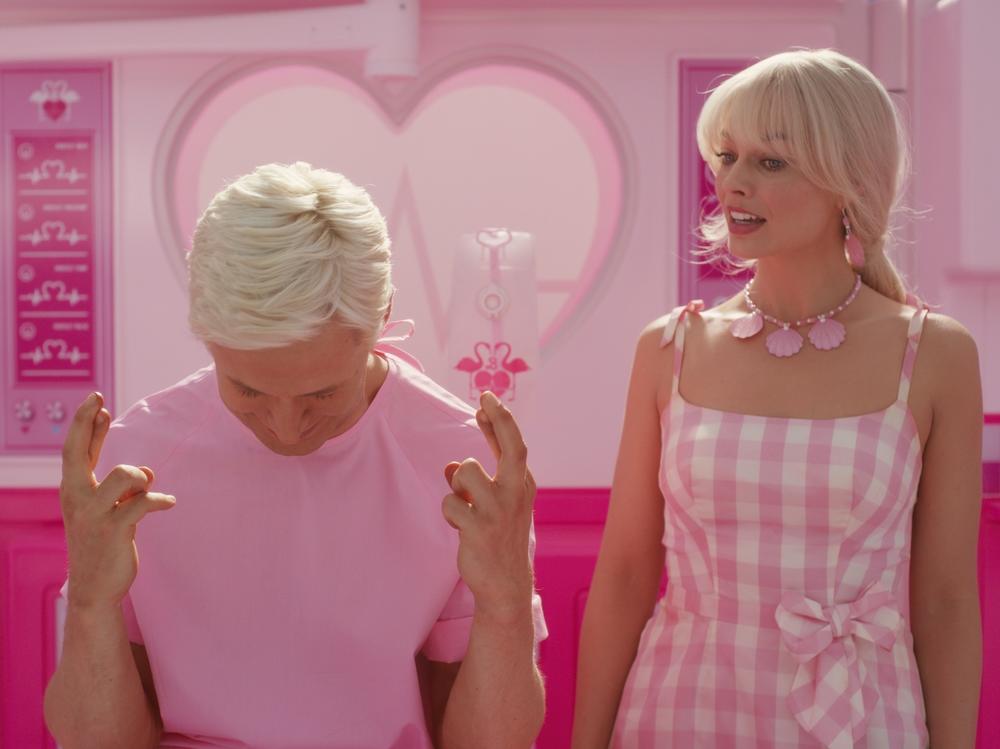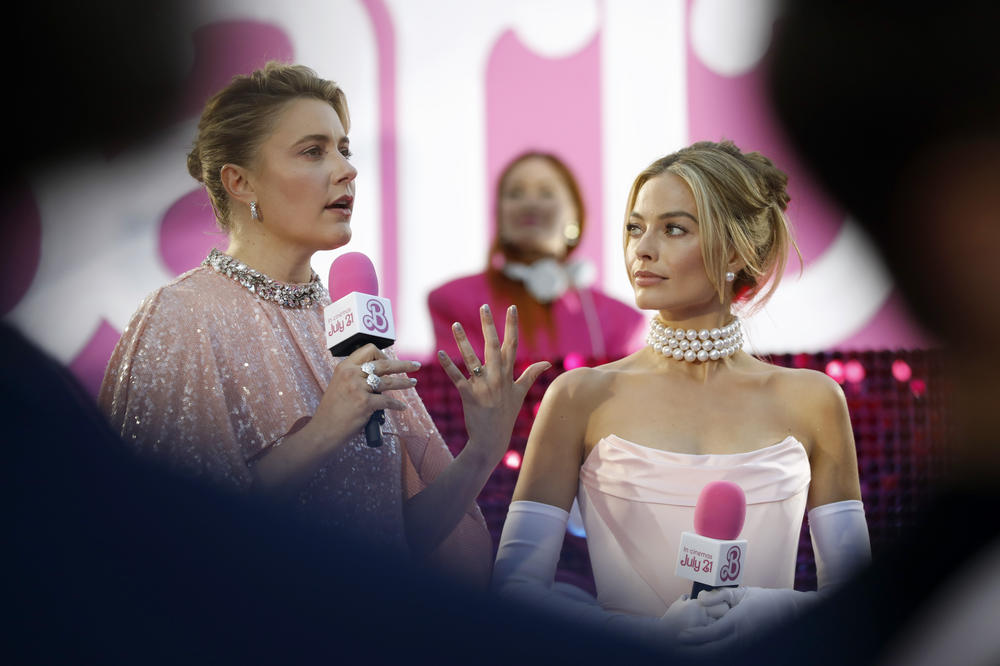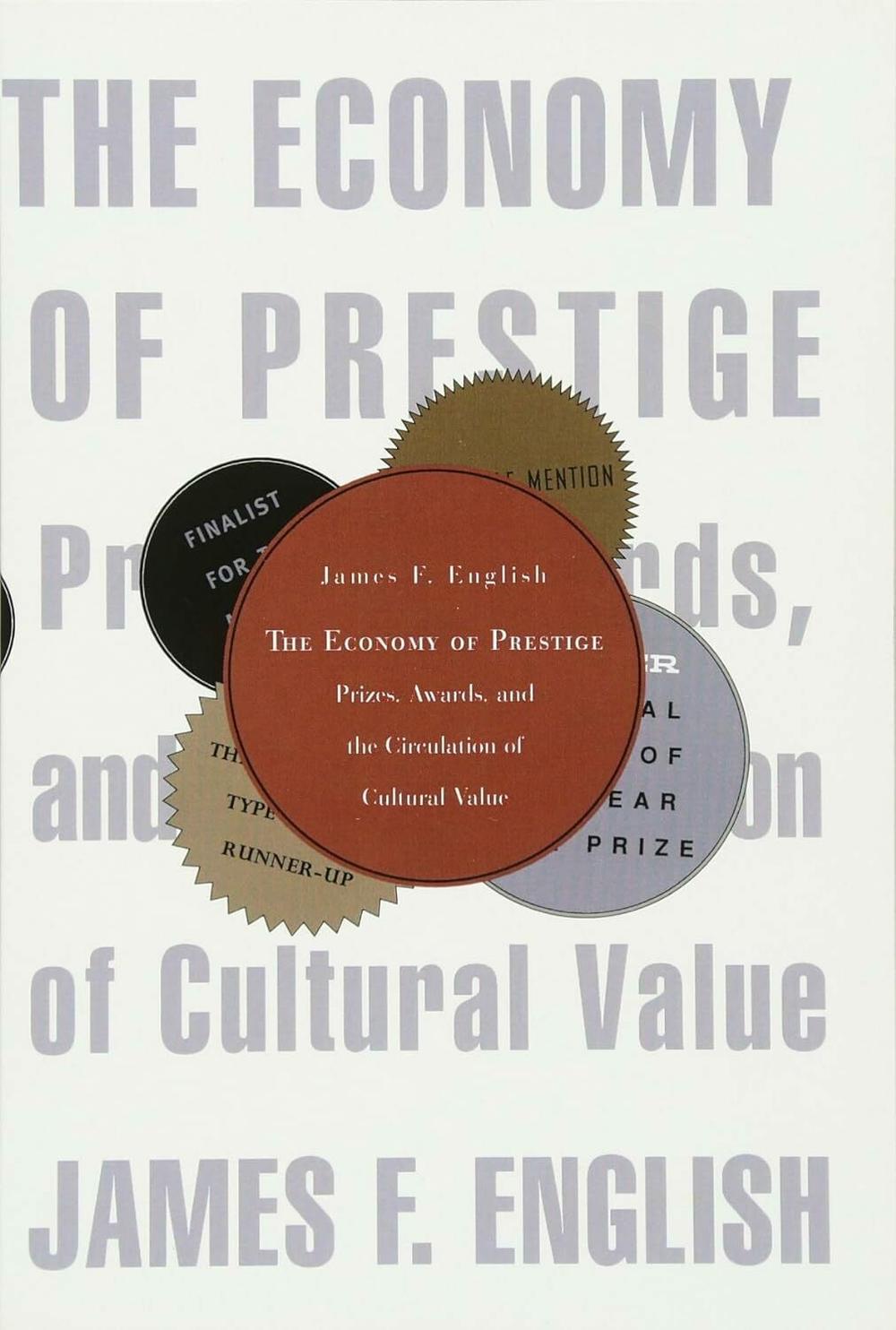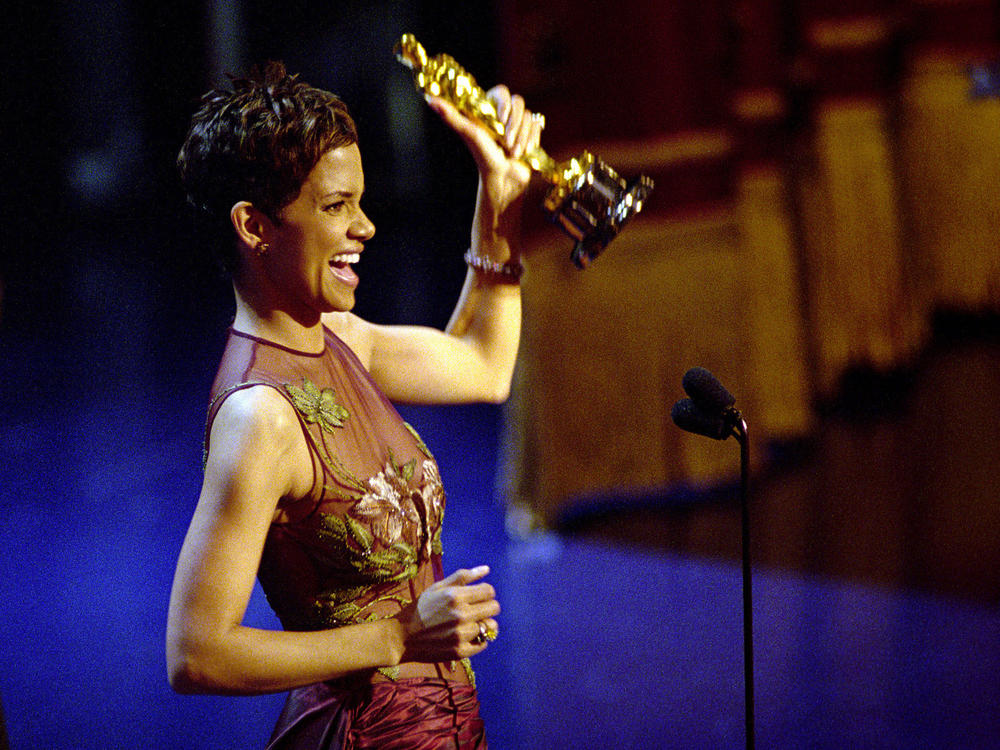Section Branding
Header Content
Award shows have become outrage generators. Surely there's another way?
Primary Content
It was when the former Secretary of State chimed in that it became crystal clear to me the plot of the Barbie discourse had been completely lost, driven off of a cliff, as it were.
"Greta & Margot, While it can sting to win the box office but not take home the gold, your millions of fans love you. You're both so much more than Kenough. #HillaryBarbie," proclaimed Hillary Clinton on both Twitter/a.k.a. X and Instagram, the day after this year's Oscar nominees were announced.
She was responding, of course, to the fact that Greta Gerwig and Margot Robbie didn't receive nominations for directing and starring in the biggest movie of 2023, Barbie. The two women did earn nods in other categories, Robbie for best picture as one of the film's producers and Gerwig for best adapted screenplay. And the film overall earned six other nominations, too.
But Clinton was hardly alone in her extreme disappointment; by that point, the "snubs" had become a rallying cry of sorts for internet practitioners of #feminism. John Stamos deemed it a "twist of irony." A TV writer said that Ryan Gosling's acting nomination for playing Ken "perfectly explains to me why we aren't in the 8th year of Hillary Clinton's presidency."
There's no violin tiny enough to accompany this sad tale. The absurd reactions to Barbie are more than just peak white feminism, as they've been called – to me, they're also a perfect encapsulation of all the ways the consumption and celebration of pop culture have shifted and been thrown out of whack in recent years. In that moment, discussion around the film took on a thudding representational responsibility and burden, the kind of weight that somehow manages to minimize all of Barbie's many other accomplishments: critical acclaim, outstanding box office, an overwhelming chokehold on the zeitgeist, and a strong awards season run (at least for those of us able to recognize it as such).
In this age of performative outrage, the film's value as a fun, smart comedy arguably holds less currency than its perceived value as a bright pink symbol of "progress" in the form of award recognition. That's ... boring! And also kind of ironic, considering Barbie the toy had been a feminist punching bag for decades before now.
As an especially stacked awards season comes to an end on Sunday, Barbie isn't the only slice of pop culture that's found itself in the middle of a debate about what and how we value beloved and acclaimed art. And I'm left wondering: What does success and achievement in pop culture even mean these days?
An economy of superlatives
James F. English's book The Economy of Prestige was first published almost two decades ago, but his analysis of the complicated history of cultural prizes is useful for beginning to unpack why awards seasons have become so fraught. English identified the cultural prize as operating along three primary axes: social, institutional and ideological. The social factor, as he described it, turns art into a "spectator sport" with stakes; out of this dynamic spring celebrities to root for and identify with, as well as an ecosystem of "cultural players" (including artists, critics, publicists, and consumers) who commune over those stakes.
Barbie – along with Christopher Nolan's Oppenheimer, the movie it will forever be tied to historically and spiritually – became a spectator sport months before awards season had even begun in earnest; audiences made an event out of seeing it, any and everything was bathed in hot pink, every corporate business huge and small capitalized off of the frenzy with Barbie-themed sales and events. Reviews were mostly positive, and ultimately it wound up topping the box office of 2023 and crossing the $1 billion mark, a first for a movie directed solely by a woman.
As English explained it in The Economy of Prestige, the institutional aspect of prizes functions as "a claim to authority and an assertion of that authority – the authority, at bottom, to produce cultural value," English wrote. In a different time, when the Oscars capped their best picture nominees to no more than five films – a time before a different Nolan movie convinced the Academy of Motion Picture Arts and Sciences otherwise – Barbie would have been celebrated for all its financial and cultural impact, but probably wouldn't have been expected to be nominated in the major categories because the academy rarely takes straight-up comedies seriously. But in this post-Dark Knight, post-#OscarsSoWhite, and post-2016 era, there seems to be an increased expectation among a larger swath of observers that this old-school institution expands its notion of what's culturally valuable.
And even as institutions like the academy come under repeated scrutiny for being out of touch, the fact that people like Hillary Clinton are concerned that the billion-dollar movie won't "take home the gold" only solidifies how revered these awards remain. This is where English's understanding of the cultural prize's ideological function comes in – that it serves to "test and affirm the notion of art as a separate and superior domain ... it invariably becomes the occasion for disputes over how accurately the value has been gauged and how legitimately the sponsors and judges may claim the authority to perform the calculation."
Are awards the only keys to the Queendom?
The Barbie fracas actually reminds me a bit of the ongoing discourse around Beyoncé and the fact that she's still never taken home a Grammy for album of the year. Now obviously, these are very different scenarios – different mediums and with different prejudices stacked against them (Beyoncé, of course is both a woman and Black). But it's telling that Jay-Z felt the need to call out the Recording Academy during the Grammys last month for pigeon-holing his wife and other Black artists in traditionally "Black" categories while shutting them out from the biggest and most mainstream ones. (He did this, no less, while receiving an honorary award.) Like Gerwig and Robbie in their respective field, the rapper and Beyoncé have both ostensibly "made it" in nearly all the ways a pop star might hope – perhaps even more so. And yet, to some extent it doesn't seem like enough.
I get it. It would be great if the directing category could have more than one woman in at a time. (It's only happened once so far, in 2021.) But there are drawbacks to focusing too much energy on getting the approval of these institutions, whether you're an unexpected blockbuster that smashes gendered expectations or a pop superstar who's at the peak of their powers. For one, it diminishes the other accomplishments that have been rightfully claimed; in the case of Barbie, Margot Robbie's ability to pitch her vision for the movie and then produce and execute it by hiring Greta Gerwig to direct and co-write it is, to be honest, a far more impressive and feminist feat than getting an acting nomination. Not to mention Gerwig's the first solo director of any gender to have their first three features land a best picture nomination. And there are just way too many Beyoncé accolades to list off here, but most notable for these purposes is the fact that she's won more Grammys than anyone else, ever.
The other issue is, quite frankly, misplaced energy. These very valid points about the barriers women and Black artists continue to face in entertainment resonate more strongly when they're applied to those with less leverage and capital than Barbie and Queen Bey, who, let's be real, are doing just fine. Where was the collective outrage over Greta Lee or Celine Song not being acknowledged for respectively starring in and directing the wonderful Past Lives, or Aunjanue Ellis-Taylor and Ava DuVernay for the ambitious, sweeping (and largely ignored) Origin?
On a similar note, yes, Barbie is something to be proud of, but it's Feminism 101 compared to Justine Triet's compelling courtroom drama about a complicated marriage, the rightfully recognized, albeit less seen Anatomy of a Fall – which landed best picture, best actress (for Sandra Hüller) and best director nods.
Even then, these debates over rightful winners and snubbed losers only matter so much, as real, concrete change goes far beyond an entirely subjective ceremony where artists must "campaign" and pay-to-play to even have a shot at being recognized. It's been 25 years since a Black woman won Album of the year; it took more than a decade after Kathryn Bigelow won the best director Oscar for another woman, Chloé Zhao, to win. One can hope that Lily Gladstone's historic nomination and/or her highly possible win will open doors for more and better roles for Indigenous performers, but you only have to look at Halle Berry's best actress win in 2002 to know that progress doesn't immediately change just because someone becomes "the first." Substantial roles for Black women in film remained few and far between for some time — Berry herself hasn't been nominated for an Oscar since — and more than 20 years later, no other Black actress has won best actress.
In the midst of awards season, it can be easy to get caught up in measuring success as it's declared by hallowed institutions – all of us who cover it and follow it closely are also complicit. But while they matter to those who receive them (or don't), to the rest of us, the outcome is destined to become little more than a trivia fact years from now. What matters most — more than the discourse and grandstanding — is what's actually up on the screen or laid down on a track — the art itself.





